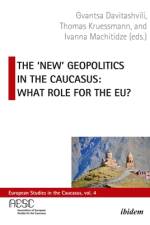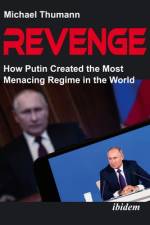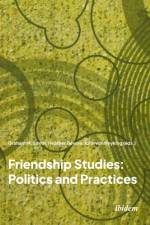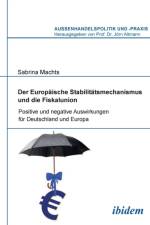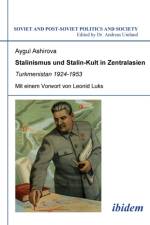Bøger udgivet af Ibidem Press
-
- Metanarration and National Identity, 1894-1972
808,95 kr. William Strnad traces the formation and development of modern Korean digraphia during the years 1894-1972, including a description and analysis of the historical discourse related to Korean phonetic script and Chinese characters. Modern Korean digraphia was contextualized and altered amid the global emancipation and speculative metanarratives of modernity, and the national metanarratives of nationalism and modernization. These constructions were shaped by the civilization discourse of the nineteenth century, imperialism, the experience of Japanese occupation, and after liberation, the Cold War politics of Marxist utopianism in North Korea and bourgeois progressivism in South Korea. By 1972, the narrative closure of the global and national metanarratives of modernity in both Koreas provided the socio-political space for the limited reversal of Korean script exclusivity, which had earlier been implemented in the North and South.
- Bog
- 808,95 kr.
-
- What Role for the Eu?
303,95 kr. Following Russia's full-scale invasion of Ukraine, the EU's ambition to develop "strategic and ambitious partnership(s) based on common values and rules, mutual interests and commitments, as well as shared ownership and responsibility" (EEAS) in the countries of the Eastern Partnership has come under much pressure. Whatever remains of this ambitions in the South Caucasus has turned into a frantic attempt to re-define the EU's role in this new geopolitical scenario. This collection focuses on Armenia and Georgia as the two "frontline" countries in which the beneficial role of the EU and the supposed commonality of values are being questioned most rigorously. Using the perspective of authors from the region, this volume offers unique insights into the debates and perceptions of the EU's involvement in the South Caucasus.
- Bog
- 303,95 kr.
-
- A Liberal Critique of the Contemporary Lack of Ethics and Rationalism in Science, Society, and Politics in the Third Millennium
205,95 kr. What are the Seven Deadly Sins? Are they still acknowledged breaches of morality and ethical norms in our Western societies in the Third Millennium? The Seven Deadly Sins present an ethical catalog, a moral mirror for princes and rulers that originates in Catholic Christianity. This little book, however, is not primarily about religion, on the contrary: It respects the Greek origins of Western thought that have survived beyond Christian faith, praises the scientific achievements of the Enlightenment, and looks at our contemporary world with critical eyes. It is a unique blend of scientific analysis, analysis of Western contemporary culture and, lastly, satire. The authors, a group of friends living in Europe, present diverse views on a wide range of topics. Their principal intention is to open a debate about ethics, science, scepticism, and hypocrisy. A thought-provoking and inspiring read--about the present as well as the future.
- Bog
- 205,95 kr.
-
- A New Balance of Power in the Right-Wing Camp
215,95 kr. This book examines the recent rise of the radical right in Italian politics in the years 2018-2022. The authors set the rise of the radical right within the context of electoral volatility and fragmentation that has underpinned post-1945 Italian politics and examine right-wing party competition between the two main radical right parties, Lega and Fratelli d'Italia, alongside the important shifts that have transformed the traditional center-right coalition (coalizione di centro-destra) in Italian politics. The volume concludes with implications for the global trajectory of the rise of different populist and radical right parties across Europe and the European Union, with many of these radical right parties now becoming significant political players across the world.
- Bog
- 215,95 kr.
-
- The Various Fates of the Remnants of Magnus Hirschfeld's Institute of Sexual Science Collection in France and Czechoslovakia, 1932-1942
1.128,95 kr. The Berlin book burning and the raiding of Magnus Hirschfeld's Institute for sexual science ("Institut für Sexualwissenschaft") in May 1933 is part and parcel of German memorial culture. Due to a rehabilitation and revival of Magnus Hirschfeld (1868-1935), noticeable in Germany in recent years, many Germans now know that the pivotal LGBT-rights precursor activist died in 1935 in exile in Nice (France), heavily traumatized by the destruction of his life work by the Nazis in Germany. This is the very first book reporting in detail on what happened in the years 1932-1935 before Hirschfeld's death and, especially, during the seven years that followed his death. Besides reporting on Hirschfeld's last years in France, this volume is the very first biography on Karl Giese and Karl Fein, the main players in the afterlife of Magnus Hirschfeld in France and Czechoslovakia. This seminal book takes up the thread where Rainer Herrn's 2023 book, on the history of Hirschfeld's Institute and the life work of Magnus Hirschfeld ended, in 1932-1933. It can also be read as an extensive contextualizing guide to the facsimile edition of the surviving Hirschfeld guestbook that was published in 2019 (Bergemann, Dose, Keilson-Lauritz & Dubout).
- Bog
- 1.128,95 kr.
-
- How Putin Created the Most Menacing Regime in the World
478,95 kr. Michael Thumann has been reporting from Eastern Europe for the leading German intellectual weekly Die Zeit for over 25 years. His book chronicles Russia's descent into an increasingly totalitarian dictatorship and the path leading to the escalation of Putin's imperialist war in 2022. The dictator and his entourage want to take revenge for the democratic opening after 1991 and supposed humiliation by the West. Putin's rule is becoming more radical. It is the most threatening regime in the world.
- Bog
- 478,95 kr.
-
- Representations of Dehumanized Societies in Literature, Media, and Political Discourses: Multidisciplinary Perspectives
443,95 kr. In this edited volume, an authoritative collective work produced by the intellectual efforts of more than forty scholars gathered at the Università Cattolica del Sacro Cuore in Milan in September 2022 for the international conference Dystopian Worlds Beyond Storytelling, the reader will find a comprehensive analysis of dystopian worlds and scenarios. Following a multidisciplinary approach, topics as political orders and techno-dystopias, de-humanized worlds and contaminations, literature and performing arts, transmedia narratives, catastrophic and apocalyptic imaginaries are analyzed in depth.
- Bog
- 443,95 kr.
-
- Politics and Practices
558,95 kr. This anthology brings together scholarship in the field of Friendship Studies. In recent decades, friendship has been a site of analysis for understanding the connections between people and groups, and as a fabric for holding the political and social together. Starting with the theoretical debates about how to conceptualize friendship as a political idea, the anthology then looks at friendship's relationship with justice, the state, and civic relations. The collection presents cutting-edge research which moves the theorization of friendship beyond western confines to consider the themes in cross-cultural and decolonized contexts.
- Bog
- 558,95 kr.
-
650,95 kr. Die Studie von Marina Denisova widmet sich der Kohärenz von (Teil-)- Sätzen in einem komplexen sprachlichen Ausdruck und einem sie verknüpfenden Konnektor. Das sind vor allem die Satzkomplexe mit dem dt. weil-V-2, sonst und dem ru. a ¿¿ sowie mit anderen, weil-V-2, sonst und a ¿¿ nahe stehenden Konnektoren der gesprochenen und zum Teil auch der geschriebenen Sprache. Der Untersuchungsgegenstand ergibt sich daraus, dass zwei unterschiedliche deutsche Konnektoren (weil-V-2 und sonst) in einem russischen Konnektor (a ¿¿) zusammentreffen (können). Die vorliegende Arbeit ist aber viel mehr als nur eine sprachvergleichende funktionale Beschreibung der deutschen und russischen Konnektoren. Dadurch dass das ¿ ¿¿ der direkten und der (rückwirkend) alternativen Motivation (ru. ¿ ¿¿) als ¿ ¿¿ "weil" und ¿ ¿¿ "sonst" auftreten kann, erweist sich das Ineinandergreifen von Kausalität, Konditionalität und Konklusivität (sowie anderen verwandten Kategorien) als zentral. Vor dem Hintergrund von weil-V-2, sonst und a ¿¿ behandelt Marina Denisova auch einige Phänomene der gesprochenen Sprache und den Sprachwandel. So leistet die Autorin nicht nur einen wichtigen Beitrag zur Erforschung von einschlägigen Phänomenen, sondern legt auch praxisorientierte, auf den Fremdsprachenunterricht und die Übersetzungswissenschaft anwendbare Erkenntnisse vor.
- Bog
- 650,95 kr.
-
- Bog
- 427,95 kr.
-
739,95 kr. Die Verbesserung des gesundheitlichen Verbraucherschutzes in Bezug auf die Lebensmittelsicherheit ist - auch aufgrund zahlreicher Lebensmittelskandale der jüngeren Vergangenheit - derzeit hochaktuell. In der vorliegenden Studie wird mit der Analyse der Fusarium-Mykotoxin-Problematik (¿Schimmelpilze") ein in der Öffentlichkeit bislang eher unbekanntes Thema aufgegriffen, dem jedoch von Expertenseite eine hohe Bedeutung beigemessen wird. Dies beruht einerseits auf der starken Zunahme der Fusarium-Problematik in jüngerer Vergangenheit, andererseits auf der Tatsache, dass Fusarium-Mykotoxine insbesondere in Lebensmitteln auf Weizenbasis und somit einer Vielzahl wichtiger Grundnahrungsmittel enthalten sind. Mykotoxine wirken bereits in sehr geringen Konzentrationen toxisch auf Menschen und Tiere. Die Gesundheitsrisiken des in dieser Arbeit schwerpunktmäßig behandelten Fusarium-Leittoxins Deoxynivalenol werden dabei insbesondere in seinen Auswirkungen auf das Immunsystem gesehen. Katharina Raupach erarbeitet auf der Basis von Laien- und Expertenbefragungen die derzeitige Risikowahrnehmung von Mykotoxinen sowie die jeweiligen Prioritäten hinsichtlich Regulierung und Management der Mykotoxinproblematik und stellt die Ergebnisse nachvollziehbar aufbereitet dar. Insbesondere die Entwicklung effektiver Risikomanagementoptionen zur Verbesserung des gesundheitlichen Verbraucherschutzes steht dabei im Fokus. Raupach zeigt, dass die Anwendung wissenschaftlich fundierter Risikokonzepte mit entsprechender Evaluation auf der Basis von Expertenmeinungen einen Beitrag zum effektiven Umgang mit der Problematik liefern kann. Hierfür wurde insbesondere das vom Wissenschaftlichen Beirat der Bundesregierung Globale Umweltveränderungen (WBGU) im Rahmen des Jahresgutachtens 1998 entwickelte Risiko-Konzept als Basis genutzt.
- Bog
- 739,95 kr.
-
- Bog
- 917,95 kr.
-
672,95 kr. Kleinbäuerlich bewirtschaftete Teemonokulturen sind in Indien äußerst selten. Auch Ihre Existenz in den Nilgiri-Bergen (Tamil Nadu), wo die lokale Volksgruppe der Badaga ca. 90% aller Teekleinbauern des Subkontinents repräsentiert, ist noch jüngeren Datums. Basierend auf einer exemplarischen Fallstudie der kleinbäuerlich wirtschaftenden Dorfgemeinde Denad zeigt Stefan Schütte soziale und ökonomische Wandlungsprozesse in der Region durch die Einbeziehung der Badaga in die Teeproduktion aufgezeigt. Dabei ist die empirische Untersuchung und die darauf gestützte theoretische Analyse des sozio-ökonomischen Zusammenhanges kleinbäuerlicher Teeproduktion im Rahmen des Verflechtungsansatzes der Bielefelder Entwicklungssoziologie eine erste tiefgehende wissenschaftliche Auseinandersetzung mit den wirtschaftlichen und sozialen Organisationsformen der kleinbäuerlichen Produktion eines klassischen Großplantagenerzeugnisses in Indien. Auf diese Weise wird ein lokal initiierter Prozeß dezentralisierter Regionalentwicklung im Kontext seiner historischen und ökonomischen Bedingungen und Veränderungen nachvollziehbar, wie auch gleichzeitig ein spezieller Beitrag zum Verständnis ländlicher Entwicklungsprozesse in der sogenannten Dritten Welt geleistet wird.
- Bog
- 672,95 kr.
-
- Bog
- 739,95 kr.
-
638,95 kr. Aufsätze: FRANK G. KÖNIGS (Marburg) Fremdsprachenlehrerausbildung: Minenfeld oder Artenreichtum? EYNAR LEUPOLD (Freiburg) Bildungsstandards Französisch: Zwischen Realität und Mythos LENKA KESTING (Berlin) & CHRISTIANE NEVELING (Leipzig) Le rendez-vous sauvé - Wörternetze zum Thema le flirt/la drague GÜNTER BURGER (Kempen) Ein moderner Stummfilm im Fremdsprachenunterricht: Luc Bessons Le dernier combat FRANK SCHÖPP (Wiesbaden) Zum Stellenwert von Mündlichkeit und Nähesprache im Französischunterricht ANNETTE ENDRUSCHAT (MÜNCHEN) Grammatikalisierung spanischer Verbalperiphrasen Rezensionen zu linguistischen und didaktischen Publikationen Zeitschriftenschau: Neues zur Didaktik der Romanischen Sprachen Profil: Prof. Dr. Claudia Polzin-Haumann (Saarbrücken) Lehrveranstaltungen: Didaktik der Romanischen Sprachen (SS 08)
- Bog
- 638,95 kr.
-
- Bog
- 1.273,95 kr.
-
739,95 kr. Notre objectif est de mettre à la disposition des professeurs de français langue étrangère et de tous les internautes francophones amoureux de la Belle Province des matériaux didactiques prêts à l'emploi sous forme d'un scénario d'apprentissage multimédia et de dossiers pédagogiques téléchargeables. Le livre ne sert que d'introduction en jetant un regard documenté et didactisé sur l'évolution historique du Québec afin de familiariser le lecteur avec les grands événements historiques de la Nouvelle-France, de lui présenter un abécédaire de la civilisation québécoise et un grand éventail d'activités pédagogiques à exploiter en classe. Il est le port de départ d'où embarquera le lecteur pour trouver sa voie navigable vers la Nouvelle-France et les trésors qui y sont cachés. Afin de profiter pleinement de la semence du livre il s'agira d'aller récolter les fleurs qui éclosent sur le site internet adjoint, protéiforme et constructiviste, auquel vous pouvez aussi ajouter votre perle précieuse afin de venir habiter ce pays de la québécitude.
- Bog
- 739,95 kr.
-
427,95 kr. - Bog
- 427,95 kr.
-
- Bog
- 382,95 kr.
-
- Bog
- 650,95 kr.


